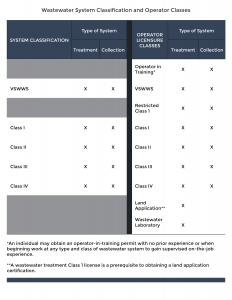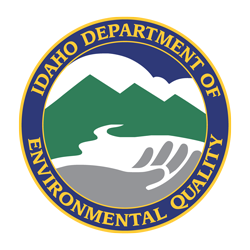Wastewater must be treated to remove pollutants before being released back into the environment. DEQ oversees the planning, design, and operation of wastewater collection and treatment systems in order to protect public health and the environment.
This accordion will not appear on the screen
Plans and specifications must be reviewed and approved by DEQ prior to the construction, alteration, or expansion of industrial and municipal wastewater systems.
Contact your regional DEQ office for instruction on how to submit plans and specifications.
A wastewater system is any publicly or privately owned collection or treatment system that generates, collects, treats, or disposes of 2,500 gallons or more of wastewater per day (IDAPA 58.01.16.6.) Systems that meet this definition are required to comply with “Idaho’s Wastewater Rules” (IDAPA 58.01.16) and the “Rules of the Board of Drinking Water and Wastewater Professionals” (IDAPA 24.05.01).
Public wastewater systems are classified based on indicators of potential health risk, (e.g., the system’s complexity, volume, variability in raw waste for treatment systems, etc.), type (e.g., treatment or collection), and class (e.g., Very Small to Class I, II, III, or IV).
Public wastewater systems must be staffed by licensed operators based on the system classification. Exceptions to the operator licensure requirements are non-pressurized drainfield and associated septic tank systems and Class A recycled water effluent distribution systems. To determine the classification, use the classification worksheet and submit it to DEQ.
- Wastewater Treatment System Classification Worksheet
- Wastewater Collection System Classification Worksheet
The system owner must submit changes in ownership or contact information to DEQ using the Owner Information Form. They must also report any changes to the responsible charge operator or substitute responsible charge operator to DEQ within 10 days using the Public Wastewater System Operator Licensure Record Form.
DEQ updates a list of wastewater treatment and collection systems that have submitted classification worksheets and received verification of the official system classification.
The Board of Drinking Water and Wastewater Professionals oversees operator licensing in Idaho, including establishing requirements for operator licenses, determining education and continuing education requirements, setting fees, evaluating applications, and determining whether licenses should be issued.
The board works with the Idaho Bureau of Occupational Licenses (DOPL) to review and recommend applications, administer examinations, collect fees, and issue operator licenses. For more information, visit the DOPL website.
To comply with DOLP training and licensing requirements, DEQ offers a variety of wastewater operator training opportunities and resources.
Wastewater Supervisor Requirement – Idaho’s “Wastewater Rules” (IDAPA 58.01.16) require that all non-exempt public wastewater treatment and collection systems have a responsible charge operator and a substitute responsible charge operator. Responsible charge refers to the employee responsible for on-site supervision and operations. Refer to the “Rules of the Board of Drinking Water and Wastewater Professionals ” for more information.
The responsible charge operator and substitute responsible charge operator must be two different people, and the responsible charge operator must hold two certificates for wastewater treatment and collection except for very small wastewater systems (VSWWS). DEQ is responsible for ensuring that wastewater systems comply with this requirement.
Operators must be licensed at a type and class equal to or greater than the system’s classification. Licensure class is based on the type and class of the wastewater system. The table below lists the licenses required for various types and classes of wastewater systems operators.
Idaho’s “Wastewater Rules” (IDAPA 58.01.16) require that all non-exempt public wastewater treatment and collection systems have a responsible charge operator and a substitute responsible charge operator. Responsible charge refers to the employee responsible for on-site supervision and operations. Refer to the “Rules of the Board of Drinking Water and Wastewater Professionals ” for more information.
wastewater treatment and collection systems have a responsible charge operator and a substitute responsible charge operator. Responsible charge refers to the employee responsible for on-site supervision and operations. Refer to the “Rules of the Board of Drinking Water and Wastewater Professionals ” for more information.
The responsible charge operator and substitute responsible charge operator must be two different people, and the responsible charge operator must hold two certificates for wastewater treatment and collection except for very small wastewater systems (VSWWS). DEQ is responsible for ensuring that wastewater systems comply with this requirement.
Operators must be licensed at a type and class equal to or greater than the system’s classification. Licensure class is based on the type and class of the wastewater system. The table below lists the licenses required for various types and classes of wastewater systems operators.
Wastewater System Contracting – Use the resources below to search for a contract operator. If you are interested in contracting your services, submit your name below.
- Search for contract operator for hire
- Submit name as a contract operator available for hire
- DEQ’s recommendations for hiring a contract operator when interviewing candidates.
Wastewater lagoons can be designed to treat, retain, and/or dispose of wastewater and must meet the requirements of the “Wastewater Rules” (IDAPA 58.01.16). In most instances, wastewater lagoons are required to be seepage tested periodically.
IDAPA 58.01.16 sets operational standards for allowable seepage and requires municipal wastewater lagoons to meet facility-specific seepage rates corresponding to the date of construction or major modification. For certain industrial facilities, seepage testing may also be required by the permit. Lagoons should be seepage tested after construction and every 10 years after the initial testing. The Guidance for Evaluating Wastewater Lagoon Seepage Rates (August 2016) assists wastewater lagoon owners and individuals responsible for seepage tests in complying with the seepage test requirements of IDAPA 58.01.16.
Testing Procedures and Data Analysis
Site conditions need to be evaluated, and testing procedures that demonstrate compliance with the rule and/or permit must be submitted to DEQ for review and approval before conducting the required seepage testing. Data of sufficient quality and quantity are required for a valid seepage test. Additionally, seepage testers should evaluate whether a sufficient number of calculated seepage rates exist to validate a compliance determination and to show data completeness through a statistical means that creates a defensible and objective number of seepage testing days needed for a complete dataset.
Calculations and Assessment Matrix
DEQ held a statistical review workshop for evaluating lagoon seepage rates to discuss and update seepage testing spreadsheets and assessment metrics and spreadsheets to better accommodate the statistical recommendations from the Myers technical paper. DEQ will accept data input/calculations at 24-hour intervals as outlined in the revised calculations spreadsheet:
Intermittent data should still be collected and submitted for evaluation to explain the behavior of the lagoon and evaporation pan during each test with the interval around the datum used to calculate the lagoon and evaporation pan elevations be limited to five minutes (before and after the reading time) or less.
This accordion will not appear on the screen
Wastewater Permits Bureau Chief

